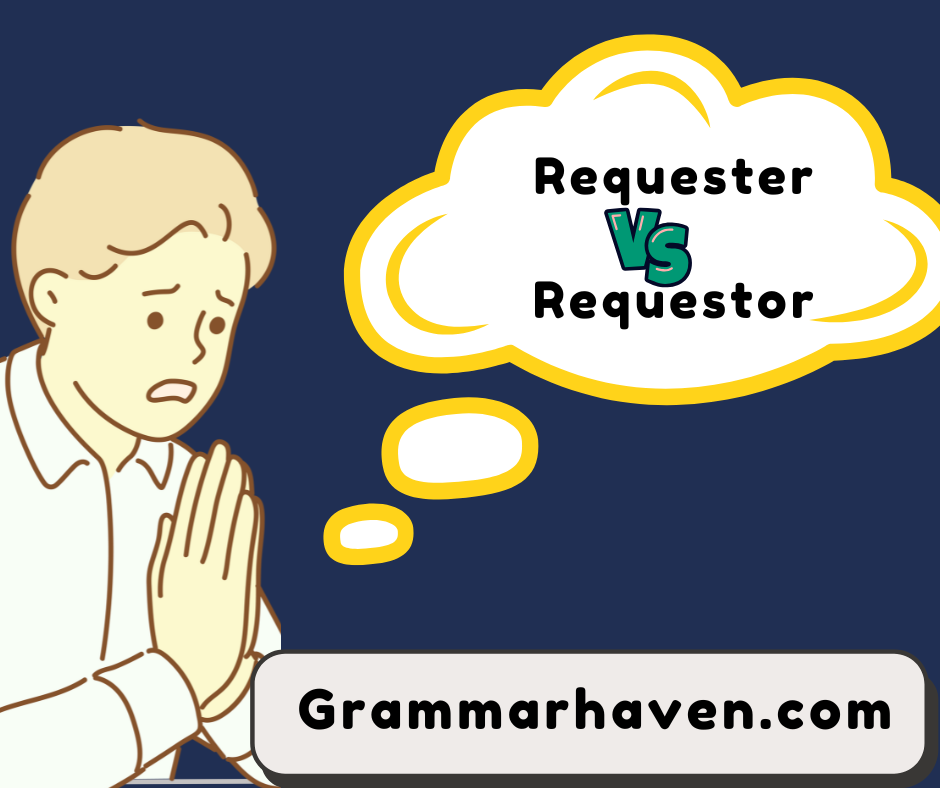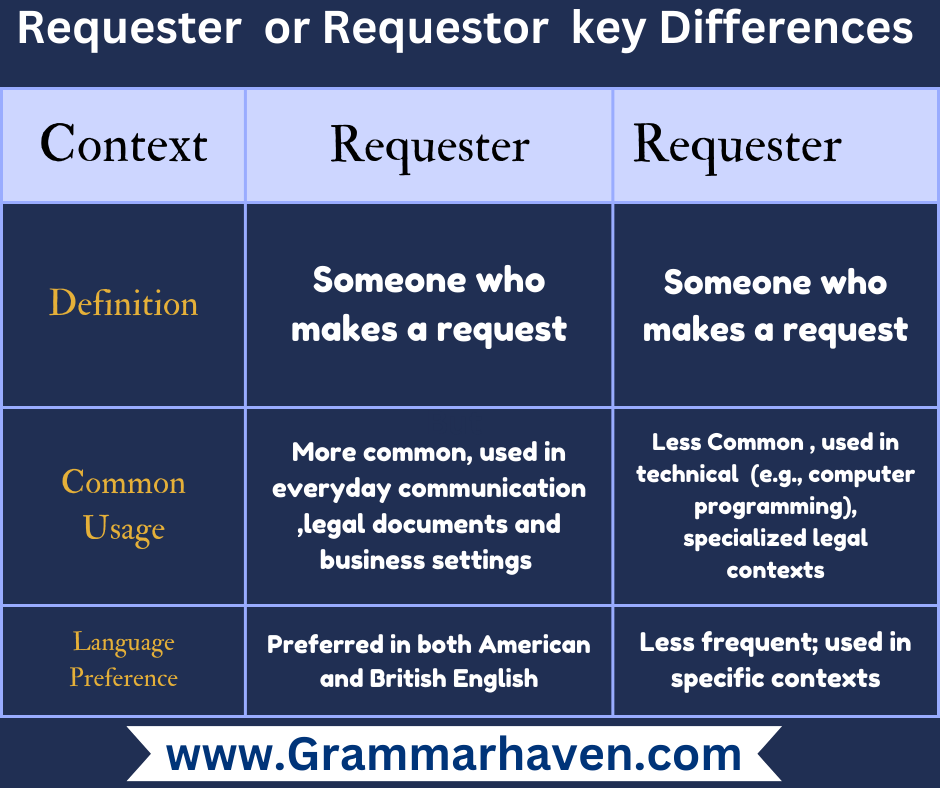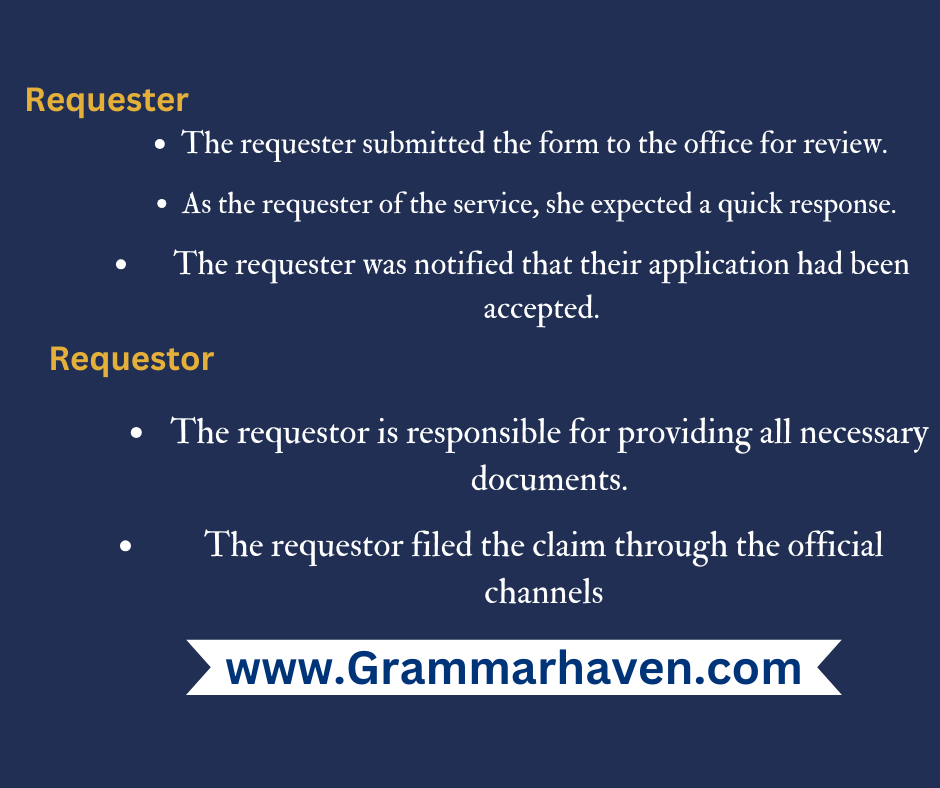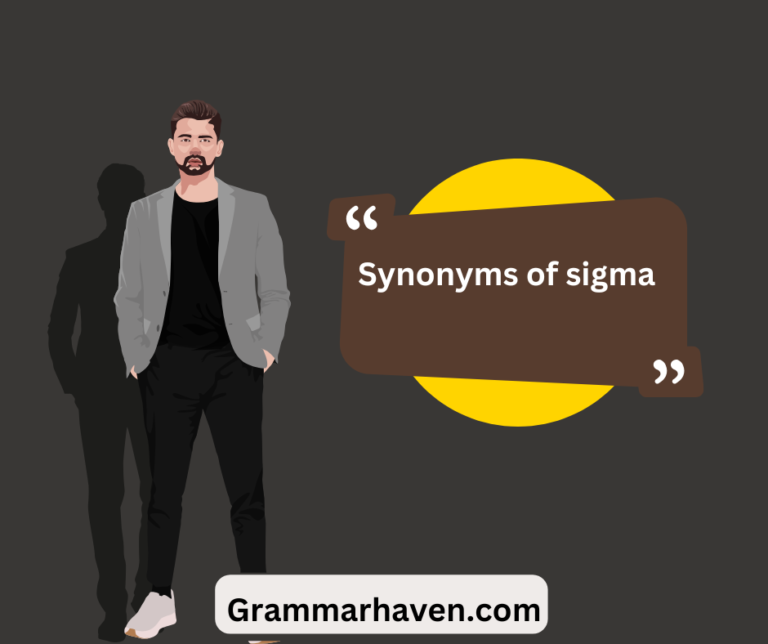Requester vs Requestor: Which Spelling is correct ?
When writing or speaking in English, people come across some words like “requester vs requestor” and get confused which version to use. Both terms are used to describe someone who makes a request, but these are used differently in American and British English. Requester is considered safe choice .In this guide, we will explore the usage of requestor or requester across different regions, and the influence of modern language trends on these terms. By the end, you’ll have a clear understanding of when and how to use these terms with clarity and confidence.
What do “Requester” vs “Requestor” Mean?
“Requester or Requestor” both terms refer to someone who makes a request, but in certain contexts they are used differently. Requester is the more widely accepted version in modern usage. However, requestor could be seen being used specially in legal and technical contexts. Let’s explore it further.
Requester Meaning and Usage:
The word requester refers to an entity or person who makes a request. This is the more common spelling both in American and British English, more commonly used in everyday conversation and writing. You’ll see it widely used across various contexts, from everyday communication to legal documents and business settings.
What Does Requestor Mean?
Requestor has the same essential meaning as requester, it is primarily used in specific contexts such as
- technical fields (computer programming )
- or specialized legal contexts
It carries a slightly more formal tone and is often found in documents or systems where precision is a key requirement. But it is less common than requester.
Source: Merriam-Webster (Requester Definition & Meaning)

“Requester” vs “Requestor” Key Differences
- Requester: As the dominant form, “requester” is versatile and can be comfortably used in any context, whether casual or formal. It’s the preferred choice in most instances across both American and British English.
- Requestor: Though less common, “requestor” isn’t incorrect. It might be chosen for stylistic reasons or due to convention in certain technical fields or specialized legal contexts. Some might perceive it as slightly more formal or specialized.

You may also like to read ,Long term or Long_term .
Requester vs Requestor Preference in American English
Requester
Requester is the most popular in American English and a widely accepted term. The Associated Press ,Chicago Manual of Style and some other style guides prefer the term requester.
Requestor
While requestor is less common but still used in legal or business contexts in specific.Its prevalence is much lower than requester in American English. In formal documents or in industries the use of the term requestor is preferred between “requester or requestor”that have maintained older traditions of language use.
Note : If you’re unsure, “requester” is always a reliable option. “Requestor” can be suitable in specific situations, but it’s not as universally recognized.
Synonyms of the Word “Requester”
| General Synonyms | In Professional Contexts | In Formal Contexts | Technical Fields |
| Inquirer | Customer | Plaintiff | User |
| Seeker | Bidder | Supplicant | Sender |
| Petitioner | Prospective Buyer | Proposer | Initiator |
| Applicant | Submitter | Complainant | Caller |
Source : Thesaurus.com (50 Synonyms & Antonyms for REQUEST)
Origins of the Word “Requester vs Requestor”
The words requestor or requester both stem from the verb “to request.”
The word “requester” has its origin in the Latin term “requaerere,” meaning “to ask or seek.” In Old French the term “requaerere” made its way into “requeste,”it captured the essence of inquiry, highlighting the human tendency to seek information and assistance.It later transitioned into Middle English.
The English language adopted the term “requeste” and added the suffix “-er” to form “requester,” referring to someone who makes a request.
“Requestor” also derives from “requaerere.”It retains the Latin agent noun suffix “-or,” which also signifies someone who performs an action.While “requestor” shares the same fundamental meaning as “requester,” it has developed a more specialized usage over time and is considered a preferred term in modern English .
Note :
The “-er” suffix in “requester” follows the Germanic influence on English, while the “-or” in “requestor” reflects the Latin influence. This dual heritage contributes to the ongoing spelling debate.
Examples of Requester or Requestor in Context

Requester
- “The requester of the refund was relieved when the customer support team resolved the issue quickly.”
- “I contacted the requester to confirm the order before sending the package.”
- “Before processing the payment, verify that the requester has submitted all necessary invoices.”
- “The requester must provide a valid reason for any additional budget allocations.”
- “The requester of the official transcripts must submit a written request along with the required fees.”
- “To access confidential records, the requester must obtain prior authorization from the concerned department.”
Requestor
- “The requestor must specify the required parameters when making an API call to ensure accurate data retrieval.”
- “Before executing the transaction, the system verifies whether the requestor has the necessary permissions.”
- “The requestor of the contract review must provide all relevant documents to facilitate a thorough analysis.”
- “Any requestor seeking access to classified information must undergo a strict vetting process.”
- “The requestor addressed the committee, emphasizing the urgency of the proposed amendments.”
- “The requestor formally appealed the decision, citing relevant regulations to support their claim.”
Conclusion
By this thorough guide we can conclude that the distinction between “requestor vs requester” highlights the rules of language usage in different contexts. “Requester” can be said as the most common term, suitable for everyday situations in both British and American English. On the other hand , “requestor” may be reserved for formal or technical environments, where specific terminology is key to precision and clear communication.
- Requester used for general and conversational writing.
- Requestor used in legal, formal, or technical contexts.
Whether you spell it requestor or requester, your choice will align with the context and purpose of your writing as choosing between requester vs requestor depends on context, audience, and style preferences.






